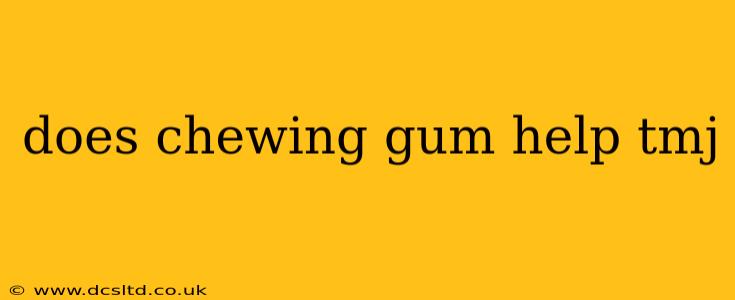Temporomandibular joint (TMJ) disorders are a common source of facial pain and discomfort. Many people explore various remedies, and chewing gum is one that often comes up. But does chewing gum actually help TMJ, or could it potentially worsen the condition? Let's delve into the complexities of this question.
The short answer is: it's complicated. While some anecdotal evidence suggests chewing gum might provide temporary relief for some individuals, there's limited scientific research to definitively support its use as a TMJ treatment. In fact, for some people, it could even exacerbate the problem.
Could Chewing Gum Worsen TMJ Symptoms?
This is a crucial point to address. The repetitive jaw movements involved in chewing gum can, in some cases, lead to:
- Increased muscle tension: Excessive chewing can strain the muscles surrounding the TMJ, leading to increased pain and discomfort.
- Joint inflammation: Repetitive stress on the joint can contribute to inflammation, worsening existing TMJ issues.
- Exacerbation of existing damage: If you already have damage to the TMJ cartilage or disc, chewing gum could further irritate the joint.
Therefore, while some individuals might find momentary relief from chewing gum, this could come at the cost of long-term damage. It’s critical to understand your own body's response.
What About Sugar-Free Gum and Jaw Exercises?
Some advocate for sugar-free gum to reduce the risk of cavities. While sugar-free might be a healthier option than sugary gum from a dental perspective, it doesn't change the potential for jaw strain. Similarly, the idea that chewing gum acts as a jaw exercise is also debatable. Targeted, therapeutic jaw exercises guided by a physical therapist are significantly different from the random, often forceful chewing of gum.
What Are the Recommended Treatments for TMJ?
Instead of relying on chewing gum, individuals experiencing TMJ symptoms should seek professional guidance. Effective TMJ treatment options include:
- Physical therapy: A physical therapist can teach you exercises to strengthen and relax the jaw muscles.
- Medication: Pain relievers, muscle relaxants, and anti-inflammatory drugs can help manage pain and inflammation.
- Splints or mouthguards: These devices can help realign the jaw and reduce stress on the joint.
- Lifestyle modifications: Stress reduction techniques, improved posture, and dietary changes can all contribute to TMJ management.
- Surgery: In severe cases, surgery may be necessary.
Does Chewing Gum Help TMJ Pain? (Addressing the PAA)
This is a common question, and the answer remains nuanced. While some might experience temporary pain relief, it's not a reliable or recommended treatment. The risk of worsening symptoms outweighs any potential benefits.
Can Chewing Gum Cause TMJ Problems?
Yes, excessive or forceful chewing gum can contribute to or worsen TMJ problems. The repetitive jaw movements can strain the muscles and joint, leading to pain and inflammation.
Is Chewing Gum Good for TMJ?
No, chewing gum is generally not considered good for TMJ. While some people may experience temporary relief, it's more likely to exacerbate symptoms due to increased stress on the jaw joint.
What Kind of Gum is Best for TMJ?
There's no type of gum – sugar-free or otherwise – that's recommended for treating TMJ. The act of chewing itself presents the risk of aggravation.
Conclusion
Chewing gum is not a recommended treatment for TMJ disorder. While some individuals might experience short-term relief, the potential for worsening symptoms makes it a risky approach. Consult a healthcare professional for a proper diagnosis and treatment plan to address your specific TMJ concerns. Remember, seeking professional help is crucial for managing TMJ effectively and preventing long-term complications.
